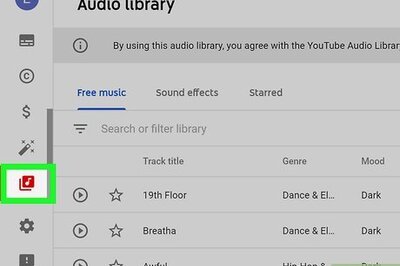
views
- A phone call is best when you need an immediate response, to discuss something complicated or sensitive, or you want to feel a more personal connection.
- An email is best when you have a simple message, need to share information with a lot of people at once, or want time to think about what to say.
- People’s preferences vary, but if you’re wondering which method to use, a good rule of thumb is to contact the person in the same way they typically contact you.
Instances When Calling is Better

You need a response right away. When you send an email, it may take a while to get a response. Because email allows people to respond at their own convenience, response times vary from a few minutes to a few days. If the matter is urgent, it’s best to pick up the phone so you can get an immediate answer. For example, you might be working on a project with a tight deadline, but you can’t move on to the next step until you go over something with your coworker. In this case, calling is likely the best option. This gets you the answer you need right away, so that you can finish your project before the deadline.

You need to discuss something complicated. If you have a complex issue to discuss, it’s best to call rather than email. Lags in response times can be a problem when you're going over a complex issue with someone, especially if they have follow-up questions. Email can get you into a time-consuming back-and-forth, whereas a quick phone call could clear everything up within a few minutes.

You need to talk about something sensitive or emotional. If you need to discuss a sensitive matter with someone, call them to avoid miscommunications. It's much easier to misread someone’s tone over email because you can't hear their voice, which can lead to misunderstandings. In fact, some research suggests that nonverbal communication (including vocal tone and emotional state) makes up 90 percent of the communication cues we receive.

You need to handle a conflict. Because it’s easier to fall into miscommunication over email, it’s a good idea to pick up the phone when you want to resolve a conflict with a friend or coworker. When you speak over the phone, you’ll be able to hear each other’s voices, which will make you feel more connected. This will make it easier to maintain empathy for one another, so that you can work things out.

You want to build closeness with someone. Research shows that phone calls are the better choice for building emotional connection. According to a study at The University of Texas at Austin, voice-based communication (such as phone calls) makes people feel much more connected than text-based communication (such as email). Hearing someone’s voice, with its unique tone, inflections, and emotions, promotes feelings of closeness in a way that email can’t. Because of this, it’s a good idea to pick up the phone and call someone when you’re hoping to build your personal connection with them.

You’re worried about someone. Because phone calls feel more personal, it’s a good idea to call (instead of email) if you’re concerned about someone and want to make sure they're okay. If you have a colleague or friend who's going through something, a phone call can go a long way to show your support!

You want to resign from your job. If you’re planning on resigning from your job, a face-to-face meeting is the best option. However, if this isn’t possible, a phone call is usually better than an email. First, schedule a phone call with your boss and let them know that you have something important to discuss. During the call, let your boss know that you are resigning, and express gratitude for the opportunities you’ve had during your time with them. After the call, you can follow up with a resignation email, so that there’s a paper trail of what you’ve discussed.
Instances When Email is Better

Your message is simple. When you have a simple matter to discuss, email could be the right call. It’s a great way to set up a meeting, confirm an appointment, or share documents with someone. If you need to contact someone about straightforward matters like these, email is a quick and efficient option.

You need to contact several people at once. When you write an email, you have the option of sending it to multiple email addresses at one time. If you need to send a reminder about an upcoming meeting, share a document with multiple coworkers, or ask a number of people the same question, an email could be the best option.

You need time to think about what to say. Email allows you to think things through as you write, so you can say everything you need to say. Maybe you need to send a long monthly update to your coworkers. Or, maybe someone has sent you a document and asked for input, and you’ve come up with thorough feedback. As long as you’re okay with waiting up to a day or two for a reply, email is likely the right choice in these situations!

You need a paper trail. Email is a great option when you want to make sure there's a documented record of your conversation. For example, you might have an in-person conversation with your employer about a change in your job responsibilities. Afterward, it's a good idea to send a follow-up email listing the changes you discussed. This makes sure you are both on the same page, and that there is a written record of the change.

You want to thank someone after a job interview. It’s a good idea to send a follow-up email within 24 hours of a job interview. Start by thanking the interviewer for their time. Restate your interest in the position, and tie this back to the ways your experience makes you the best person for the job. When you send a follow-up email, you’re not just doing a good thing for yourself. You’re also doing a good thing for the employer because you’re showing them that you’re genuinely interested in the role.
Pros & Cons of Calling

Pros It makes creative collaboration easier. When you’re talking to someone on the phone, you can communicate back-and-forth in real time, instead of waiting on email replies. This allows you to bounce ideas off of each other, which can lead you down spontaneous and creative paths. It can help you build a friendly rapport with your coworkers. Research shows that verbal communication produces more feelings of connectedness than text-based communications. This means that phone calls can strengthen your social bond with your coworkers and contribute to a positive energy in the workplace. It shows that you care. Whether you’re calling to check in on a coworker you’re worried about, or to speak to your boss about resigning from your job, a phone call shows that you care because it’s more personal than an email.

Cons It can be nerve-racking. Phone calls require you to think on your feet, which can be a lot of pressure. You need to come up with your responses in the moment, rather than in your own time. Because of this, many people suffer from phone-call anxiety. Talking on the phone more often can help you fight phone anxiety. Practicing mindfulness can also help. This involves focusing on what you’re feeling in the present moment while avoiding judging yourself. You might get sent to voicemail. If you happen to call the other person while they’re busy, they might miss your call. Since it’s easy to overlook a missed call, try sending a follow-up text asking the person to call you back. It’s easier to forget the topics you discussed. When you talk to someone over the phone, there won’t be any electronic record of your conversation. This can be a downside if you or the other person forget the details of your conversation later. Take notes while you talk on the phone to make sure you don’t forget any important information. Or, send a quick follow-up email summarizing your conversation to make sure you have a record of it.
Pros & Cons of Emailing

Pros It’s an easy way to share straightforward information. If you have a simple message to convey, email is a very efficient way to communicate it. Examples of this include informing someone of a meeting time, or letting coworkers know that you’ll be out of the office on PTO for a few days. You can connect with several colleagues at once. This can be a great way to connect with all your coworkers, even people you don't typically get to talk to. For example, you could start a fun email thread with a fun question for everyone to answer on a weekly or monthly basis. It's great for busy schedules. When you call someone, there’s always the chance that you’ll catch them at a bad time and be sent to voicemail. With email, however, you can send your message whenever you're free, and the recipient can respond whenever their schedule allows.

Cons It’s less personal. People tend to gravitate toward text-based communication (like email) because they think it will be less awkward than calling. Research shows, however, that people feel less socially connected when they communicate over email because they can’t hear the other person’s voice. It can take a while to get a response. Many people respond to an email within an hour of receiving it, but some people can take up to a few days to respond. Some research suggests that age contributes to this—younger people tend to reply more quickly, while older people might take a bit longer to respond. It’s harder to collaborate over email. Because email conversations can involve lags or delays in response on both sides, it’s harder to collaborate with people and bounce off their ideas. Going back and forth takes a bit longer, and there isn’t as much spontaneity or creativity in the moment.
Do people prefer it when you call or email?

It depends on the situation and the time of day. Many prefer phone calls for certain types of conversations and email for others. For example, a coworker might prefer phone calls during business hours, but they might prefer email if you need to contact them outside of their normal work hours. If you aren’t sure of the other person’s situational preferences, just ask!

Preferences also vary from person to person. Though there are many reasons for this, research shows that age might be a factor. Younger people tend to reply to more emails than older people, and they tend to reply more quickly. This suggests that younger people might be more comfortable with email than older people. A good rule of thumb is to contact the other person in the same way they usually contact you. For example, if you have a coworker who typically emails you and rarely calls over the phone, there’s a good chance they prefer email.
















Comments
0 comment